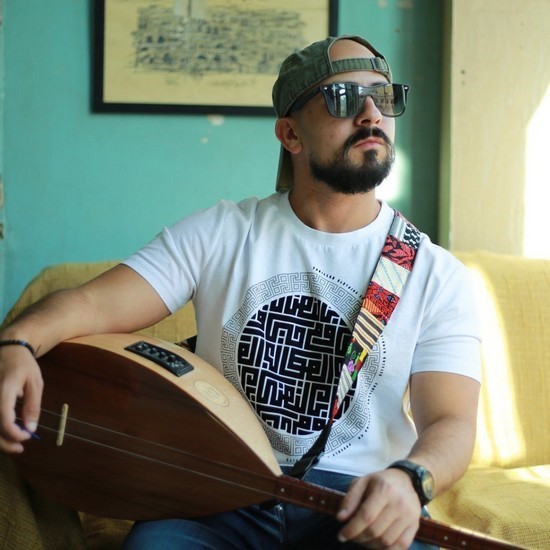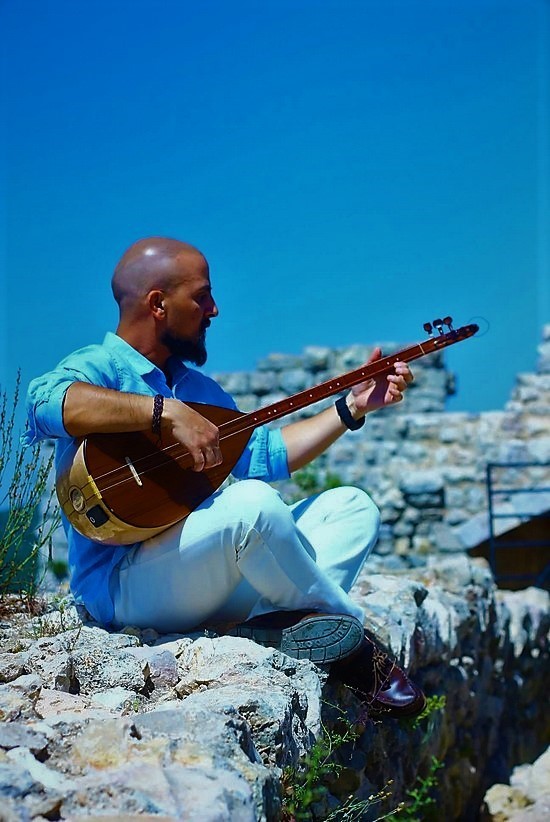Luai Ahmaro is a singer who discovered his talent at a
relatively old age and made his way into the oriental music scene.
اضافة اعلان
As a child, Ahmaro was curious about musical tracks, their
origins, and the beauty they embrace. In his first years of university, he
wanted to get more involved in the music scene, especially the oriental one. At
the time, the flute caught his attention, but he could not distinguish between
it and the shababa (reed pipe), as they both look alike.
 According to Ahmaro, it is important to have
such songs to document the Palestinian heritage through music. (Photo: Handout
from Luai Ahmaro)
According to Ahmaro, it is important to have
such songs to document the Palestinian heritage through music. (Photo: Handout
from Luai Ahmaro)
“When I bought my first shababa, around 2009, I used to go
to Bethlehem villages, specifically to Nahalin village, which is known for
playing the shababa. To me, oriental musical is magical,” Ahmaro said in an
interview with Jordan News.
Ahmaro is from Hebron, but has Kurdish origins. Therefore,
he was interested in discovering the Kurd culture through music. He started
practicing the saz (long-neck lute), which is used in Kurdish music.
He plays four different musical instruments with different
levels of skill, the singer said. He plays the saz, the shababa, the flute, and
the daf (drum). He likes these instruments because they are part of the
oriental culture and reflect Levantine music. They also “give traditional music
unique vibes”, he said.
“Shababa is very dear to my heart as it makes me imagine the
mountains of Palestine,” the singer said.
In 2020, Ahmaro released his first song, which was a
Palestinian mashup, with Natalie Saman; it reached around 12 million views on
YouTube. He released several other songs, such as Ya Leli and Mahma Kan.
His vocal capabilities have grown since the first mashup
because he kept on practising, trying to develop himself, he said.
He said he decided to make his first song a Palestinian
mashup because he wanted to pay tribute to Palestine, where he formed his
musical and intellectual identity.
Ahmaro listens to diverse music from around the world; he
used to search for mashups of traditional songs, and since she could not find
one of Palestinian traditional songs, he wanted to be among the first musicians
to release such mashup.
According to Ahmaro, it is important to have such songs to
document the Palestinian heritage through music.
Due to the success of his first Palestinian mashup, people
started asking him to release a second one, which motivated him. The
Palestinian heritage is rich with traditional songs, but he found it
challenging to find a suitable sequence of songs to create a smooth transition
between them. For his second Palestinian mashup he decided to go with the
traditional Palestinian wedding theme to ensure a smooth transition, he said.
In December 2021, he released his second Palestinian mashup with Saman.
 (Photo: Handout from Luai Ahmaro)
(Photo: Handout from Luai Ahmaro)
“The second mashup gives people the feeling that they are attending
a Palestinian wedding. When I wrote the script, I wanted to focus on a dramatic
idea that we do not feel at weddings, which is the feelings of the bride’s
father,” the singer said.
Ahmaro translated the first and second Palestinian mashups
in order to reach non-Arab listeners and to deliver the feelings these
traditional songs embrace, he said.
His musical activities are not limited to singing
Palestinian songs; he also sings in Kurdish and Turkish languages. He believes
that Kurdish and Turkish music expresses a huge amount of feelings, he said.
The competition in the field motivates musicians to create
new and appealing music. On the negative side there is criticism by other
musicians, without beneficial advice that would help them improve themselves,
he said.
Ahmaro likes to encourage people to make the sort of music
they want; music, and art in general, enable people to express themselves, he
said. He also tries to promote oriental music.
Read more Culture and Arts




